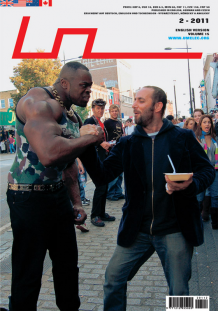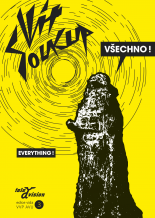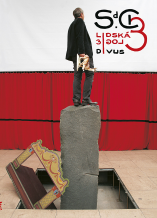|
The European Union was not created out of regional cultural interest but rather to support free, cross-border investment. If you have a full wallet or a credit card, then you are an investment. This is a given concerning EU residents, and therefore they can travel where they want. We don’t want poor people, and thus there’s an iron curtain at the eastern border of the Union. It’s just they don’t call it that. It’s such an ugly word. Nation-states are getting poorer, companies richer and there’s nothing essentially wrong with that. It’s immaterial who’s getting rich as long as enrichment is the general principle for functioning. So it’s not surprising that multinational companies take on the role of cultural administrator and financier. Companies set up their own institutions much like ministries. They are often criticized for not acting consistently and democratically like State-run institutions. But they cannot and they do not want to. Even if it’s not immediately apparent, we are talking about very pragmatic projects with clear marketing objectives. In this regard, they are much more transparent than their cousins in the State sector. Corruptibility and non-systematicness in State-run institutions provide for a state where projects belong to no one. In Eastern Europe only these new private institutions are willing to pay their employees well. There are still not enough to provide a living for all intellectuals and artists willing to commit their services. And until the situation gets better, criticism from the lower-paid ranks will be heard even louder. Even if the programs of these self-sufficient initiatives are impeccable. But apparently even oil and telco giants have plans in this area, so perhaps things will get better. We can only hope that these corporate cultural networks will have a longer shelf-life than the Soros program’s cultural centers. The program’s collapse at the end of the 1990s only deepened skepticism, failed to teach cultural circles independence as was intended, but rather left them to beg from the State. That is the only thing that cultural bodies today have gotten better at. The impression is still that there’s no other way (to obtain funding). Perhaps just one rebuke of leaders of these cultural initiatives. Presenting your activities as a potential source of usable information for the banking sector is naive and doomed for humiliation. The type of inspiration that banks get from intellectuals and artists is not clear for the time being. Let’s hope that their think tank* does not come up with something more malicious than bleeding clients of money that they don’t yet have. This trick can however be perfected over a long time. Abstraction of interest rates, multimedia loans, and conceptual court distraint procedures may be just around the corner. By the way, does anyone know someone close to them that still saves money? Do you remember that word? The time has come for small flexible initiatives to be reborn as institutions. They associate their financial security with freedom and quality. But can you rank these terms side by side? Often the argument of natural development and growth is used. But this is definitely not a necessity and it should not be a starting point for others. Use of large spaces and operating with the help of long-term financial support force one to plan programs years in advance. You lose the option of quick reaction to situational changes. There will be no freedom of the moment unless previously agreed with donors. This is only one feature of the whole dependency structure. A number of words have strengthened their meaning and positioning in the dictionary. We try for example to be influential, we defend social interests, we maintain stability, we strengthen security, and we try to improve the quality of everything. An influential financial group, lobbyist or curator. We have no hobbies! Everything needs to be stabilized, so as to secure the movement of finances and thus improve the quality of our activities. Those who don’t understand this, have no clear concept, no constructive opinion, and no innovative approach to work, well they should go do something else. They no longer have a place even in the art world, where such good-for-nothings had long taken refuge (hid themselves). We will gradually codify the underground scene, we will civilize naive art so that theirs will remain only the tag of bad artists. Art is now a segment like any other. Bad goods will always be bad. All doom-harkening words of the last century were devalued (defaced). Banks offer freedom bringing mortgages and loans. If you want to be independent, buy a mobile phone or subscribe to revolutionary cheap internet services. These and many other words have been disgraced. They have either lost their meaning or it has been shifted. Use them in a serious conversation and you’ll be thought a fool. Take out a loan or a mortgage and you will have lost your freedom perhaps for several decades, because you will not be able to even move from your not-yet-paid-for apartment. You will shake in fear over the possible loss of even the stupidest job, because two-thirds of your monthly salary goes to pay for your housing. You will become independent perhaps when they shut off your mobile. And you will never click your way to a revolution with spam mail and advertisements. But you cannot destroy the meanings themselves. Where to look for them. Did they move to different words, were new words formed, or do we not use these meanings because we no longer need them? We can get along without them because were are doing just fine? Is this a big and acceptable compromise? Do some people live outside the realm of this compromise? We are traveling in a fully SUVereign vehicle, which, as with most others, looks more and more like an invasion tank than a civilian car. This is the design of safety. Its weight is a metaphor for quality. We stir up dust from which we are only able to collect fragments of our surroundings and scraps of history. We are heading off to expand our interests and to empower our independence. We feel safe and perhaps even free. And we think that everyone’s on board.


Рекомендуемые статьи

|
|
Why political intellectuals, do you incline towards the proletariat? In commiseration for what? I realize that a proletarian would hate you, you have no hatred because you are bourgeois, privileged, smooth-skinned types, but also because you dare not say that the only important thing there is to say, that one can enjoy swallowing the shit of capital, its materials, its metal bars, its polystyrene…
|

|
|
"In Cameroon, rumours abound of zombie-labourers toiling on invisible plantations in an obscure night-time economy."
|

|
|
There’s 130 kilos of fat, muscles, brain & raw power on the Serbian contemporary art scene, all molded together into a 175-cm tall, 44-year-old body. It’s owner is known by a countless number of different names, including Bamboo, Mexican, Groom, Big Pain in the Ass, but most of all he’s known as MICROBE!… Hero of the losers, fighter for the rights of the dispossessed, folk artist, entertainer…
|
|

































 New book by I.M.Jirous in English at our online bookshop.
New book by I.M.Jirous in English at our online bookshop.
Комментарии
Статья не была прокомментированаДобавить новый комментарий